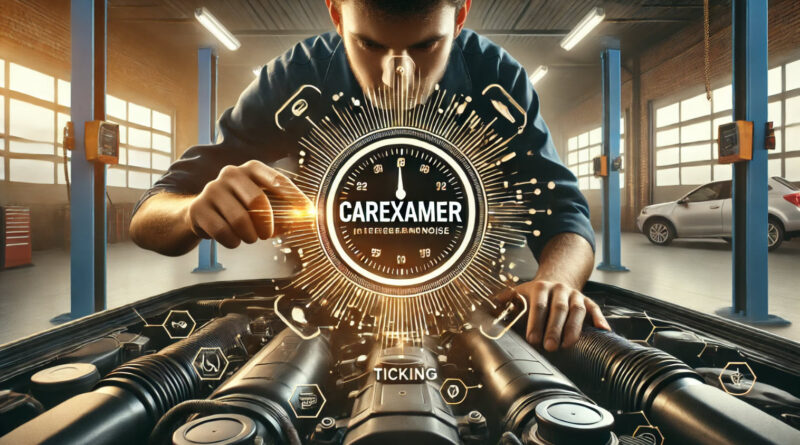Why Is Car Engine Making a Ticking Noise?
In this article, we’ll explore the common reasons why your engine might be making a ticking noise and what you can do about it. If you’ve ever heard a ticking noise coming from your engine, it’s natural to feel concerned. A ticking engine noise can range from a minor annoyance to a serious issue that requires immediate attention. Understanding the potential causes of this noise is crucial for determining whether it’s something you can address on your own or if it’s time to visit a mechanic.
Common Causes of a Ticking Engine Noise
- Low Engine Oil Level or Pressure
- Cause: One of the most common reasons for a ticking noise is low engine oil. Engine oil lubricates the moving parts of your engine, preventing friction and wear. If the oil level is low or the oil pressure is inadequate, parts like the valve lifters and camshafts can start making a ticking noise.
- Solution: Check your oil level using the dipstick and top it off if necessary. If the oil level is fine but the noise persists, it could indicate an issue with oil pressure, which may require professional inspection.
2. Worn or Faulty Lifters
- Cause: The lifters (also known as tappets) are responsible for opening and closing the engine valves. Over time, lifters can wear out or become clogged with sludge, leading to a ticking noise.
- Solution: If you suspect lifter wear, it’s best to have a mechanic diagnose the issue. In some cases, adding an oil additive designed to clean lifters can help, but severe wear may require replacement.
3. Exhaust Manifold Leak
- Cause: A ticking noise can also occur if there’s a leak in the exhaust manifold. The manifold is where the engine’s exhaust gases are collected and directed into the exhaust system. A small crack or loose manifold bolts can cause exhaust gases to escape, creating a ticking sound.
- Solution: Inspect the exhaust manifold for signs of damage or loose bolts. If you find any issues, it’s important to have them repaired promptly to prevent further damage.
4. Fuel Injector Noises
- Cause: Modern engines often use fuel injectors to deliver fuel to the combustion chamber. The injectors open and close rapidly, which can produce a ticking noise, especially in high-pressure fuel systems. This noise is usually normal and nothing to worry about.
- Solution: If the ticking noise is coming from the injectors, it’s likely normal. However, if the noise changes or becomes louder, it’s worth having a mechanic check the injectors to ensure they are functioning properly.
5. Worn Engine Components
- Cause: Over time, various engine components can wear out, leading to ticking noises. This can include worn camshafts, rocker arms, or timing chains. As these parts degrade, they may not operate as smoothly as they should, causing ticking or tapping sounds.
- Solution: Worn engine components generally require professional diagnosis and repair. Regular maintenance and timely replacement of worn parts can prevent more serious engine issues.
6. Spark Plug Issues
- Cause: If a spark plug is loose, cracked, or worn, it can cause a ticking noise. This is because the spark plug is not properly seated, allowing combustion gases to escape.
- Solution: Inspect your spark plugs to ensure they are correctly installed and in good condition. Replace any damaged or worn spark plugs as needed.
7. Timing Chain or Belt Problems
- Cause: The timing chain or belt synchronizes the rotation of the crankshaft and camshaft, ensuring the engine’s valves open and close at the correct times. If the timing chain or belt is loose, worn, or not properly tensioned, it can cause a ticking noise.
- Solution: Timing chain or belt issues should be addressed by a mechanic, as failure of these components can cause severe engine damage.
When to Seek Professional Help
While some ticking noises can be resolved with simple maintenance, others may indicate a more serious problem that requires professional attention. If the ticking noise is accompanied by other symptoms, such as a check engine light, loss of power, or unusual vibrations, it’s best to have your vehicle inspected by a qualified mechanic as soon as possible.
A ticking noise in your engine can be caused by a variety of issues, ranging from minor to serious. Understanding the potential causes and addressing them early can save you from costly repairs and keep your vehicle running smoothly. Regular maintenance, including checking your oil levels, replacing worn components, and ensuring proper engine function, is key to preventing ticking noises and other engine problems. If you’re ever in doubt, consulting with a professional mechanic is the best course of action to ensure your engine stays in top condition.
Buying a used VW. Buying used vauxhall, BMW, Jaguar, Ford, Volvo, Range rover, Bentley, Aston Martin, Porsche, Ferrari, Lamborghini, Maserati, Hyundai, Tesla, Honda, Pagani

